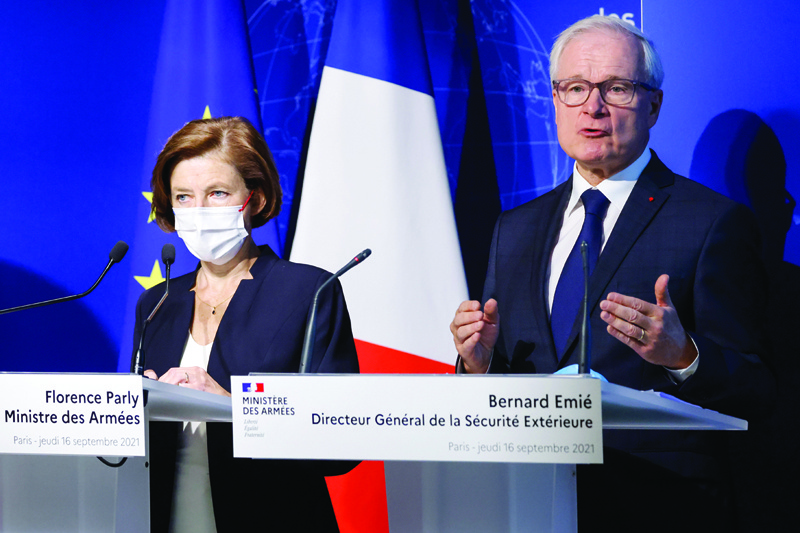PARIS: France said yesterday its troops deployed in the Sahel region of Africa had killed the head of Islamic State in the Greater Sahara (ISGS) extremist group who was wanted for deadly attacks on US soldiers and foreign aid workers. Adnan Abu Walid Al-Sahrawi formed ISGS in 2015 after splitting with Al-Qaeda linked jihadists and pledging allegiance to the Islamic State (IS) group, which at that time controlled swathes of Iraq and Syria.
Sahrawi was "neutralized by French forces," President Emmanuel Macron tweeted early yesterday. "This is another major success in our fight against terrorist groups in the Sahel," Macron said. Defense Minister Florence Parly said Sahrawi died following a strike by France's Barkhane force, which battles jihadists across the arid expanses in the Sahel region of Western Africa.
"It is a decisive blow against this terrorist group," she tweeted. "The attack was carried out a few weeks ago, and today we are certain that it was the Number One of ISGS," Parly told RFI radio later yesterday, without identifying where Sahrawi was killed. Sahrawi was "the one we were looking for, since he was the uncontested, authoritarian leader with no rival" within the jihadist group, she said. "When you take out a key link in the chain, you disrupt and weaken these terrorist groups," she said, adding that the second- and third-in-command of ISGS had been "neutralized" over the spring and summer.
String of killings
Sahrawi was behind the killing of French aid workers in 2020 and was also wanted by the United States over a deadly 2017 attack on US troops in Niger. The group is also blamed for most of the jihadist attacks in Mali, Niger and Burkina Faso. The flashpoint "tri-border" area is frequently targeted by ISGS and the Al-Qaeda-affiliated Group for the Support of Islam and Muslims (GSIM) with deadly attacks against civilians and soldiers.
The United States had offered a $5 million reward for information on the whereabouts of Sahrawi, who was wanted over an October 4, 2017, attack in Niger that killed four US Special Forces and four Niger soldiers. On August 9, 2020, in Niger, the ISGS head personally ordered the killing of six French aid workers and their Niger guides and drivers.
In late 2019, the group carried out a series of large-scale attacks against military bases in Mali and Niger. A former member of Western Sahara's Polisario Front independence movement, Sahrawi joined Al-Qaeda in the Islamic Maghreb (AQIM) and had also co-led Mujao, a Malian Islamist group responsible for kidnapping Spanish aid workers in Algeria and a group of Algerian diplomats in Mali in 2012.
The French military has killed several high-ranking members of ISGS under its strategy of targeting jihadist leaders since the start of its military intervention in Mali in 2013. In June this year, Macron announced a major scaleback in France's anti-jihadist Barkhane force in the Sahel after more than eight years of military presence in the vast region to refocus on counter-terrorism operations and supporting local forces.
"The nation is thinking this evening of all its heroes who died for France in the Sahel in the Serval and Barkhane operations, of the bereaved families, of all its wounded," Macron added in another tweet after Sahrawi was killed. "Their sacrifice is not in vain. With our African, European and American partners, we will continue this fight."
'Take back control'
The north of Mali fell under jihadist control in 2012 until they were pushed out of the cities by France's military intervention in 2013. But Mali, an impoverished and landlocked nation home to at least 20 ethnic groups, continues to battle jihadist attacks and intercommunal violence, which often spills over to neighboring countries.
French Foreign Minister Jean-Yves Le Drian reiterated yesterday the need for local governments to step up efforts to wrest back control of vast swathes of the Sahel from the insurgents. "It's particularly important, especially in Niger, that state actors quickly take back control of territories abandoned to the Islamic State and recover its role, so that daily life can resume with essential services," he told France Info radio. - AFP



